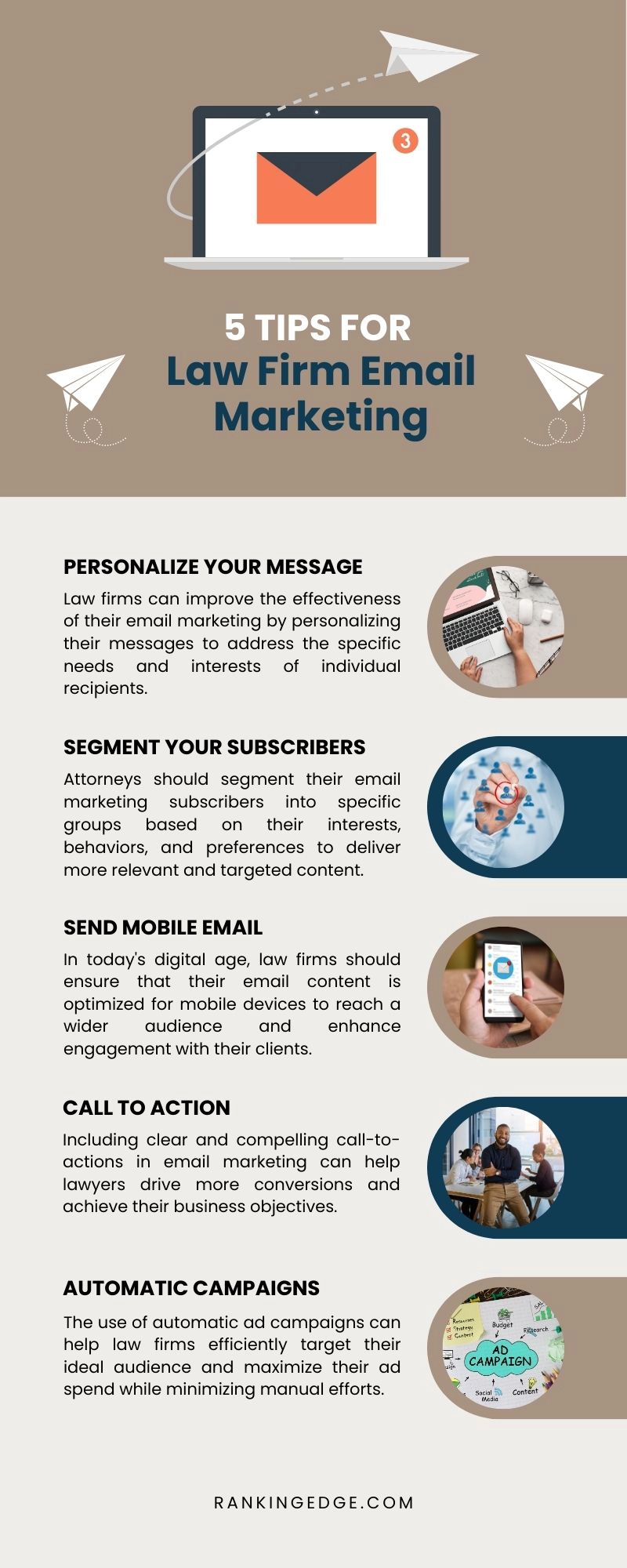Content marketing for law firms has become a popular (and profitable) way for attorneys to promote their services online.
Content marketing can be a powerful tool for attracting new clients, building brand awareness, and establishing thought leadership within the legal industry.
Definition of Content Marketing for Law Firms
Content marketing for law firms involves creating and sharing informative, educational, and engaging content to attract and retain clients. This can include:
- Blog articles
- Videos
- Infographics
- e-Books
- Webinars
- Social media posts
- Podcasts
- Newsletters
The goal of content marketing is to provide value to potential clients and position the law firm as a trusted authority in their field.
Importance of Content Marketing for Law Firms
In today’s digital age, people are increasingly turning to the internet to research and find legal services.
By creating high-quality, informative content, law firms can establish themselves as a reliable source of information and build trust with potential clients.
Content marketing also allows law firms to showcase their expertise and differentiate themselves from competitors.
Brief Overview of the Tutorial
This tutorial will provide a step-by-step guide to creating and implementing a successful content marketing strategy for law firms.
We will cover topics such as developing a content strategy, creating high-quality content, promoting content, and measuring success.
By the end of this tutorial, you will have the tools and knowledge to effectively use content marketing to grow your law firm’s online presence and attract new clients.
Developing a Content Strategy for Law Firms
A successful content marketing strategy for law firms starts with a solid plan. Here are the key steps you should take when developing your content strategy:
Identifying Target Audience
The first step in creating a successful content marketing strategy is identifying your target audience. Your content should be tailored to the specific needs and interests of your ideal clients. Here are some factors to consider when defining your target audience:
- Demographics: Who are your ideal clients? What is their age, gender, income level, and geographic location?
- Legal needs: What legal issues does your target audience face? What questions do they have?
- Online behavior: How does your target audience consume information online? What social media platforms do they use? What search terms do they use to find legal services?
Determining the Types of Content to Create
Once you have defined your target audience, the next step is to determine the types of content that will be most effective in reaching and engaging them.
Here are some examples of content formats that work well for law firms:
- Blog articles: Informative, educational blog posts can help establish your firm as a thought leader in your area of law and provide value to potential clients.
- Videos: Videos are a highly engaging form of content that can help explain complex legal issues and showcase your expertise.
- Infographics: Visual aids like infographics can help simplify legal concepts and make them easier to understand for potential clients.
- E-books: Longer-form content like e-books can provide in-depth information on a particular legal topic and help establish your firm as an expert in that area.
Creating a Content Calendar
To ensure that your content is consistent and well-planned, it’s important to create a content calendar. This will help you stay organized and ensure that you are creating content on a regular basis.
Tips for creating a content calendar:
- Determine the frequency of your content: How often will you publish new content? Will it be daily, weekly, or monthly?
- Set deadlines: Establish deadlines for when each piece of content should be completed.
- Assign responsibilities: Make sure that each piece of content has a clear owner who is responsible for creating and publishing it.
- Schedule promotions: Plan ahead for how you will promote each piece of content on social media and other channels.
Creating a Plan for Content Distribution
Creating great content is only half the battle – you also need to ensure that it gets in front of your target audience.
Strategies for distributing your content effectively:
- Social media: Share your content on social media platforms like Facebook, Twitter, and LinkedIn to reach a wider audience.
- Email marketing: Send your content to your email list to keep your subscribers informed and engaged.
- Guest posting: Consider guest posting on other relevant blogs or websites to reach a wider audience.
- Paid advertising: Consider investing in paid advertising, such as Facebook or Google Ads, to promote your content to a specific target audience.
Creating High-Quality Content for Law Firms
Creating high-quality, informative content is essential for a successful content marketing strategy. Here are some tips for creating engaging and effective content that will attract and retain potential clients:
Identifying the Types of Content that Work Best for Law Firms
Different types of content work better for law firms than others. Here are some examples of content formats that are especially effective:
- Educational content: People are often looking for answers to specific legal questions. By providing clear and informative answers to common legal questions, you can establish your firm as a reliable source of information.
- Case studies: Sharing real-world examples of your legal work can help potential clients understand the types of cases you take on and the outcomes you have achieved.
- Thought leadership content: Writing articles or creating videos that demonstrate your expertise in a particular area of law can help establish your firm as a thought leader in that field.
Tips for Creating Engaging Content
Creating engaging content requires more than just sharing information. Here are some tips for creating content that will capture the attention of potential clients:
- Be concise: Keep your content focused and easy to digest.
- Use visuals: Incorporate images, videos, and infographics to make your content more engaging.
- Use storytelling: Telling real-world stories can help make your content more relatable and memorable.
- Use a conversational tone: Avoid using overly technical language or legal jargon.
Ensuring Accuracy and Reliability in Legal Content
Accuracy and reliability are essential when it comes to legal content. Here are some tips for ensuring that your content is accurate and reliable:
- Use reliable sources: Make sure that you are relying on reputable sources when creating your content.
- Cite your sources: When referencing legal cases or other sources, make sure to provide proper attribution.
- Get legal review: Have a legal expert review your content to ensure that it is accurate and legally sound.
Best Practices for Optimizing Content for Search Engines
To maximize the impact of your content, it’s important to optimize it for search engines.
Best practices for optimizing your content:
- Use relevant keywords: Incorporate relevant keywords and phrases into your content to improve your search rankings.
- Use meta descriptions: Write clear and informative meta descriptions that accurately describe the content of your page.
- Use alt tags: Use alt tags to describe images on your site for users who are visually impaired or who have images turned off in their browser.
- Build backlinks: Build high-quality backlinks from other sites to improve your search rankings.
With these tips and best practices, you can create high-quality, engaging content that will help establish your law firm as a thought leader and attract potential clients to your site.
Local Content Marketing for Lawyers
One effective way to reach potential clients in your area is through local content marketing.
By creating content that is specifically tailored to the needs and interests of your local community, you can establish your firm as a trusted authority in your area of law and attract clients who are looking for legal services in your geographic location.
Tips for creating effective local content marketing campaigns for lawyers:
- Identify local keywords: Use local keywords and phrases in your content, such as the name of your city or region, to help your content rank higher in local search results.
- Create location-specific content: Create content that is specifically tailored to the needs and interests of your local community. For example, you could create a guide to local laws or regulations that affect your clients.
- Partner with local businesses: Partner with other local businesses, such as real estate agencies or financial advisors, to co-create content that is relevant to your shared audience.
- Attend local events: Attend local events and conferences to network with potential clients and share your expertise.
- Use local directories: Make sure your law firm is listed in local directories, such as Yelp or Google My Business, to help potential clients find you when searching for legal services in your area.
By incorporating these strategies into your content marketing efforts, you can establish your firm as a leading authority in your local legal community and attract clients who are specifically looking for legal services in your area.
Keyword Research for Content Marketing for Law Firms
Keyword research is an essential component of any content marketing strategy.
By identifying the keywords and phrases that potential clients are using to search for legal services online, you can create content that is optimized to rank higher in search engine results pages (SERPs).
Here are some tips for conducting effective keyword research for content marketing for law firms:
- Identify primary and secondary keywords: Start by identifying the primary keywords that are most relevant to your law firm’s areas of practice. Then, identify secondary keywords that are related to your primary keywords.
- Use keyword research tools: Use keyword research tools, such as Google Keyword Planner or Ahrefs, to identify relevant keywords and phrases that potential clients are using to search for legal services.
- Consider local keywords: If you are targeting clients in a specific geographic area, make sure to include local keywords and phrases in your research.
- Focus on long-tail keywords: Long-tail keywords are longer and more specific phrases that potential clients may use to search for legal services. By focusing on long-tail keywords, you can create content that is more targeted and specific to the needs of your potential clients.
- Analyze competitor keywords: Analyze the keywords and phrases that your competitors are using in their content to identify opportunities for your own content marketing strategy.
By incorporating these tips into your keyword research process, you can create content that is optimized to rank higher in search engine results pages and attract potential clients to your law firm’s website.
Where to do Keyword Research for Attorneys
There are several online services available that can help attorneys with keyword research. Here are some of the best online services to do keyword research for attorneys:
- Google Keyword Planner – Google Keyword Planner is a free tool that provides keyword ideas and helps with estimating the search volume for each keyword. It is an essential tool for any lawyer looking to create a strong online presence.
- SEMrush – SEMrush is a comprehensive SEO tool that includes keyword research. It provides in-depth analysis of competitors’ websites and offers keyword suggestions based on industry, location and language. While there is a monthly fee to use SEMrush, it is well worth the investment for serious digital marketers.
- Ahrefs – Ahrefs is a powerful tool that offers keyword research, backlink analysis, and competitor research. It offers competitive analysis for your legal business, so you can improve your search engine optimization and online visibility. Though it comes at a cost, it is an essential tool for any lawyer looking to up their digital marketing game.
- Moz – Moz offers a suite of SEO tools and resources, including keyword research. Moz offers comprehensive metrics, including search volume, competition, and difficulty scores. It also offers a free toolbar that displays valuable SEO metrics directly in your browser.
Attorneys can greatly benefit from online keyword research tools to help them increase their online visibility and reach their target audience.
Each of these tools has its unique features and pricing plans, so it is essential to review them carefully to choose the best ones for your legal practice’s specific requirements.
At Ranking Edge, we use SEMRush for our keyword research and marketing.
Promoting Law Firm Content
Creating high-quality content is just the first step in a successful content marketing strategy. Once you have created your content, it’s important to promote it effectively to ensure that it reaches your target audience.
Strategies for Promoting Your Law Firm’s Content
Social Media Marketing
Social media is a powerful tool for promoting your law firm’s content and reaching a wider audience. Here are some tips for social media marketing:
- Choose the right platforms: Identify the social media platforms where your target audience is most active and focus your efforts on those platforms.
- Share your content regularly: Share your content on social media platforms on a regular basis to keep your followers engaged and informed.
- Use visuals: Incorporate images, videos, and infographics into your social media posts to make them more engaging.
- Engage with your audience: Respond to comments and messages from your followers to foster a sense of community and establish your firm as a trusted authority in your field.
Email Marketing Tactics
Email marketing is a highly effective way to promote your law firm’s content to your email list. Here are some tips for email marketing:
- Create a newsletter: Create a regular newsletter that highlights your latest content and provides value to your subscribers.
- Segment your email list: Segment your email list based on factors such as client type or legal issues to ensure that your content is relevant to each subscriber.
- Use clear and compelling subject lines: Use subject lines that clearly and compellingly describe the content of your email to encourage subscribers to open and read it.
- Include a call to action: Include a clear call to action in your emails, such as inviting subscribers to schedule a consultation or follow your law firm on social media.
Leveraging Paid Advertising
Paid advertising can be a powerful tool for promoting your law firm’s content to a targeted audience. Here are some tactics to consider:
- Use Google Ads: Consider using Google Ads to promote your content to potential clients who are searching for legal services online.
- Use social media ads: Consider using social media ads, such as Facebook or LinkedIn ads. You can reach a targeted audience based on demographics, interests, or job titles.
- Use retargeting ads: Promote your content to people who have previously visited your website or engaged with your law firm online.
Best Practices for Building Backlinks to Law Firm Content
Building high-quality backlinks to your law firm’s website content can help improve your search engine rankings and increase the visibility of your content.
Best practices for building backlinks:
- Create high-quality content: Focus on creating high-quality, informative content that is valuable to potential clients and other websites.
- Reach out to relevant websites: Identify websites that are relevant to your area of law. Reach out to them to ask if they would be willing to link to your content.
- Participate in online communities: Participate in online communities, such as forums or social media groups. Build relationships with these potential link partners.
- Monitor your backlink profile: Use tools like Ahrefs or Moz to monitor your backlink profile. This will ensure that your website is not linked to low-quality or spammy websites.
Incorporating these strategies into your content marketing strategy can effectively promote your law firm’s content and reach a wider audience.
Final Thoughts and Conclusion to Content Marketing for Law Firms
Content marketing is a powerful tool for law firms looking to attract and retain clients in today’s digital age.
By creating high-quality, informative content that is tailored to the needs and interests of your target audience, you can establish your firm as a trusted authority in your field. You can build long-term relationships with your clients.
In this tutorial, we have covered the key steps involved in developing a content marketing strategy for law firms, creating high-quality content, promoting that content, and conducting keyword research.
By following these steps, you can create a content marketing strategy that is tailored to the unique needs and interests of your law firm’s target audience.
Remember, effective content marketing is an ongoing process. It requires consistent effort and a commitment to creating content that provides value to your potential clients.
With that in mind, here are some final thoughts and recommendations:
- Stay up to date on trends: Stay up to date on the latest trends and best practices in content marketing to ensure that your strategy remains effective over time.
- Analyze your results: Use tools like Google Analytics to track your results and make adjustments to your strategy as needed.
- Collaborate with other professionals: Consider collaborating with other professionals. Marketing experts or content creators can help you create and promote high-quality content.
If you haven’t yet implemented a content marketing strategy for your law firm, now is the time to start.
By creating informative, engaging content that is tailored to the needs and interests of your target audience, you can build a loyal client base and establish your law firm as a trusted authority in your field.





